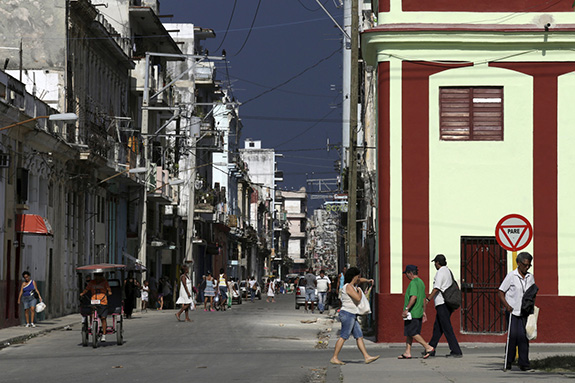By Rhina Guidos (Second in a Series)
 BAYAMO, Cuba (CNS) – In 2004, with the divorce rate looming around 70 percent in Cuba, the Catholic Church called for a “year of the family.”
BAYAMO, Cuba (CNS) – In 2004, with the divorce rate looming around 70 percent in Cuba, the Catholic Church called for a “year of the family.”
There was little hope that workshops, discussions and reflection would do much good to remedy the situation. A decade later, the figure of divorce on the island hovers in the 60-65 percent range, and it’s hard to say how many of those are Catholic.
With a high divorce rate, secularism, a societal change of values, “there’s little to conserve of the fabric” of Cuba’s traditional concept of family, said Bishop Alvaro Beyra Luarca of Bayamo-Manzanillo.
The exodus of Cubans who have left the island for any number of reasons – economic, professional or political – is a big factor that has threatened and eroded the concept of the traditional family in Cuba, but there are many other factors, too, Bishop Beyra said.
As the Catholic Church prepares for this fall’s World Meeting of Families in Philadelphia, the challenges being faced by what’s left of the Cuban family weighs on those concerned with how it will affect the country and the Church.
When St. John Paul II visited in 1998 and celebrated Mass in Santa Clara, he recognized the country’s dire situation.
“The social situation experienced in this beloved country has created not a few difficulties for family stability: for
example, material scarcities – as when wages are not sufficient or have a very limited buying power – dissatisfaction for ideological reasons, the attraction of the consumer society,” he said.
“These and other measures involving labor or other matters have helped to intensify a problem which has existed in Cuba for years: People being obliged to be away from the family within the country, and emigration, which has torn apart whole families and caused suffering…”
The Center for Demographic Studies at the University of Havana said the country’s divorce rate had almost tripled in four decades, rising from 22 divorces per 100 marriages in 1970, to 64 in 2009. In 1960, Cuba had the highest fertility rate it had seen since the end of World War II, but today it has one of the oldest populations in Latin America. According to recent figures from the U.N., about 70 percent of women of child-bearing age use a form of birth control, and abortion is readily available on the island.
For the Church, the family is a strong component of faith, the “domestic church” as the Second Vatican Council called it. But if there is no “domestic church,” what does it mean for the Church’s future on the island?
The problem is complicated, said Father Juan Elizalde of Bayamo. These days, shaped by secularism or because of economic uncertainty, young or old, few Cubans have a concept of embarking on a “lifelong project” that is marriage with another person, much less having children with them.
